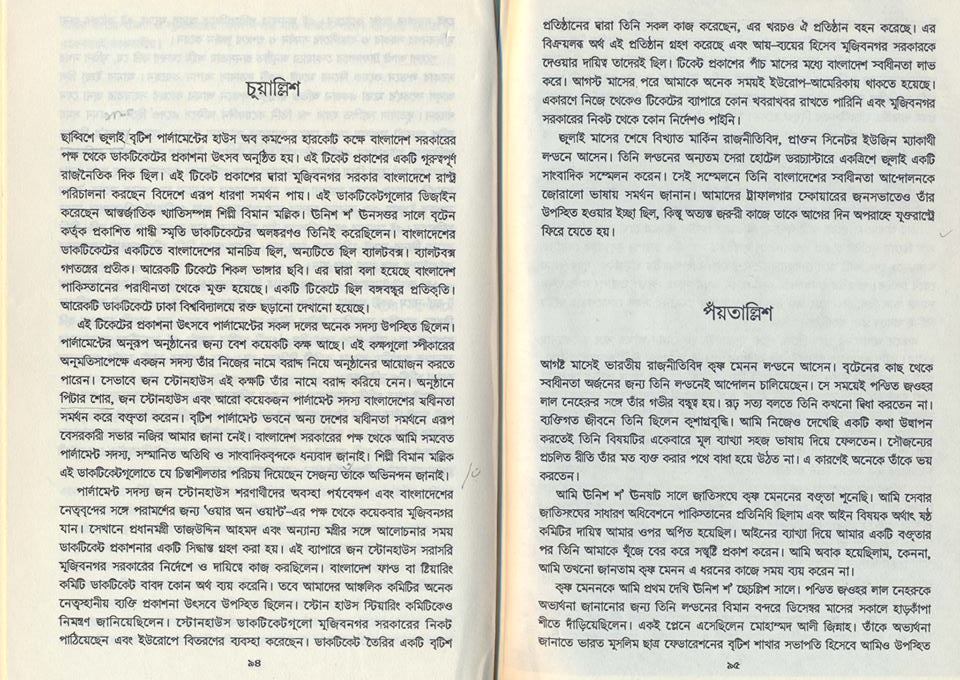Extract from “Prabase Muktijuddher Dinguli” (My Days Abroad During the War of Liberation) by Abu Syeed Chowdhury
Translated and reviewed by Sajid Rahman, Biman Mullick, and Michael Gallery

Justice Abu Sayeed Chowdhury
Introduction
Abu Sayeed Chowdhury (January 5, 1921 – August 2, 1987) was a jurist and the second President of Bangladesh who was the first to be sworn into office.
Justice Chowdhury . . . was elected as President of Bangladesh on 12 January 1972. On 10 April 1973, he was again elected as President of Bangladesh, and in the same year (December) he resigned and became special envoy for external relations with the rank of a minister. On 8 August 1975, he was included in the cabinet of Bangabandhu Sheikh Mujibur Rahman as minister of Ports and Shipping.
26th July. At the Harcourt Room in the British Parliament House of Commons, the issue ceremony of stamps on behalf of the Government of Bangladesh took place. This issue had an important political aspect. These stamps gave legitimacy to the perception that the Bangladesh Government in exile at Mujibnagar was conducting the affairs of Bangladesh. These stamps were designed by internationally reputed artist Biman Mullick. He had also designed the 1969 Gandhi centenary stamp for Great Britain. One of the newly issued Bangladesh stamps featured a map of the country, the other a ballot box. The ballot box symbolized democracy. Another stamp featured an illustration of breaking free from shackles. It impressed that Bangladesh was freed from subjugation by Pakistan. One stamp featured an image of Bangabandhu (friend of the people), the popular name of the Bangladesh nationalist movement leader Sheikh Mujibur Rahman. Another stamp featured smeared blood symbolizing the genocide committed at Dhaka University on 25th March, 1971.
Many members of different political parties were present at the publication ceremony. The British Parliament has a number of rooms for programs like this one. A member of parliament could book such a room in his name obtaining permission from the Speaker of the House. That is how John Stonehouse had booked this room. At the program, a number of British MPs namely Peter Shore, John Stonehouse and others spoke in support of the Bangladesh Independence Movement. In my view this is perhaps the only time a meeting had taken place at the British Parliament House in support of the freedom of another country. On behalf of the Bangladesh Government, I thanked the present British Parliament members and invited guests and journalists. I thanked Mr Biman Mullick for his artistic creativity and the thought that had gone towards designing the stamps for Bangladesh.
On behalf of the “War on Want” British MP John Stonehouse visited Mujibnagar a number of times to see in person the condition of the refugees and consult with the Bangladesh leadership there. At that time based on his discussion with the Bangladesh Prime Minister Tajuddin Ahmed and other Ministers it was decided that the first stamps of Bangladesh should be unveiled. Mr. John Stonehouse accordingly worked with the direct instruction and responsibility reposed on him by the Mujibnagar Government. Neither the Bangladesh Fund nor the Steering Committee incurred any expenses for the issuance of the stamps. Many members of our regional committee however were present at the publication ceremony. Stonehouse had invited the Steering Committee. Stonehouse made arrangements for the stamps to be sent to the Mujibnagar Government and for distribution in Europe. He got the stamps printed by a British philatelic agency who also incurred the cost of printing them. It was the responsibility of the agency to collect the sale proceeds from the issue and submit the income and expense statement to the Mujibnagar Government. Within five months of the stamps issuance, Bangladesh won her victory. After August I spent a lot of time in America and Europe. Hence I could not follow up with further events related to the stamps issue, neither did I get any further instructions in this regard from the Mujibnagar Government.
Towards the end of July, ex U.S. Senator Mr. Eugene McCarthy visited London. He spoke at a press conference on 29th July at the renowned “The Dorchester, London.” In his speech he strongly supported the Independence Movement for the creation of a free Bangladesh. He was also supposed to attend our public meeting at Trafalgar Square, but due to some urgent work he had to return to the US earlier that afternoon.
This extract is from Probashey Muktijuddher Dinguli by Abu Sayeed Chowdhury, published by The University Press Limited, Dhaka, 1990. Reproduced with permission from the original publisher.
Citation:
Chowdhury, Abu Sayeed. Introduction. Prabase Muktijuddher Dinguli. University Press Limited, 1992, pp. 94-5.

